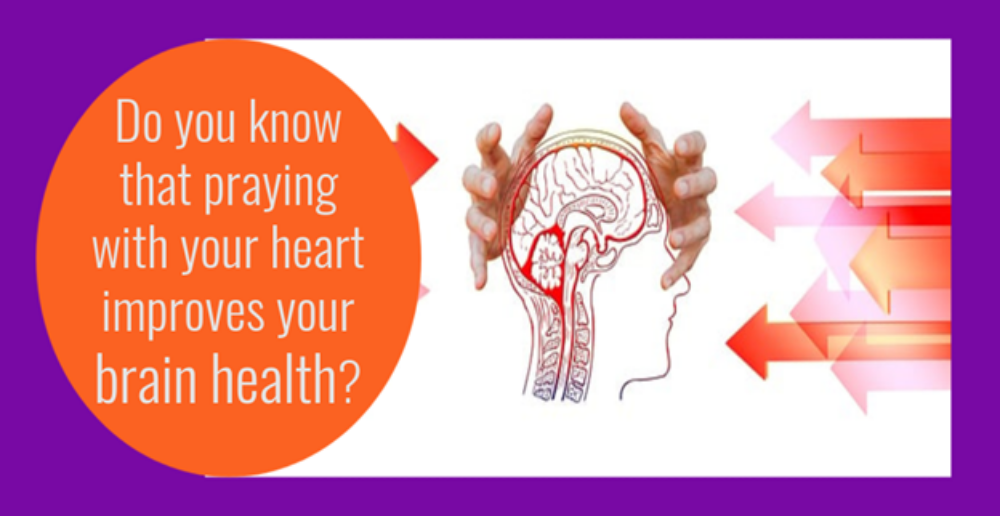A CLEAR Path to God
Have a look…
Do You Know That Praying with Your Heart Improves Your Brain Health? Part 2

Disclaimer
No content on this website should ever be used as a substitute for direct medical advice from your doctor or other qualified health professional or clinician
We Christian women have always known that although, like everyone else, our life can face serious challenges from time to time, praying regularly allows us to experience better general wellbeing and health (we’d likely refer to this phenomenon as ‘blessings’ and ‘grace’).
But in recent years, scientists have zoned in on this phenomenon. And they are publishing their findings.
We should all be very encouraged by what they are finding.
----
In Part 1 of this article, we looked at the findings of well over a dozen health and science professionals published in the last 3 years.
These experts studied the link between prayer, mindfulness, and meditation and human health and wellbeing in general — and, in particular, brain health.
Their results showed that prayer of any kind —but in particular meditation, contemplation and mindfulness —benefits the health of human beings in significant and very welcome ways.
In Part 2 of this article, you’ll discover other ways in which prayer, including worship, benefits brain health in particular and human health and wellbeing in general.
You’ll discover that worship and prayer have a well-documented positive effect both on the person who engages in prayer and worship and the person who is the subject of prayer.
What stood out most for me in the findings of the experts are the following statements:
- With every thought, word, and action, you’re ‘sculpting’ your brain
- Everything we do (for better or worse) shapes the brain
- Like a muscle, the more you exercise the brain in a particular direction, the stronger it becomes
Let’s continue on now and see what else the scientists have to say regarding the amazing effects of prayer on the health of the human brain and the human person in general.
To begin with, here’s a really interesting —but not surprising —statement from one researcher. He points out that prayer has been hard to study.
He explains that this is due to the fact that while science tests observable relationships, processes, and mechanisms, prayer invokes a higher being, something outside the boundaries of natural phenomenon, which science cannot really study.
However, he continues, science CAN study the outcomes of the belief in God i. e. whether people who believe in God report a better quality of life than people who do not.
Scientists, he says, CAN prove that believing that God exists is fundamentally good for you as a human being.
And this is the case, he says, even though not all scientists carrying out these studies are certain that God exists.
Experts tell us that human psychological experiences have a bearing on important physiological processes, including immune system functioning.
And research has found that prayer can impact these psychological processes, thus providing potential explanations for how prayer impacts human health.
Behavioral neuroscientists have begun exploring these questions, and are coming up with some highly significant and hopeful insights.
Everything we do (for better or for worse) shapes the brain
How Scientists Study the Brain

How could a scientist possibly know what's going on inside a person's brain?
Scientists explain that the answer lies in a technique called functional magnetic resonance imaging, or MRI.
Scientists explain that when we intently and consistently focus on our spiritual values, we increase the blood flow to our frontal lobes and to our anterior cingulate.
This causes the activity in the emotional centers of our brain to decrease.
That helps us develop the capacity to make responses that maintain and even restore community.
Because our brain will constantly change, say the experts, we need to be mindful of whether we’re developing in good ways or in destructive ways.
They explain that the disciplines we engage every day, every week, every year, fundamentally shape the destiny of our lives.
And this being the case, they point out, we need to be aware of the extent to which our behavior affects our brain.
One expert has found that we can positively shape our brains by maintaining personal religious faith and spending time each day in prayer and personal reflection.
Because our brain will constantly change, we need to be mindful of whether we’re developing in good ways or in destructive ways.
Results that Christian Women Will Want to Know About

The research shows that
- Prayer can reduce feelings of isolation, anxiety, and fear.
- 12 minutes of daily reflection and prayer…
- enhances our social awareness and empathy
- helps us love our neighbour by developing a heightened sense of compassion and subduing negative emotions
- This enhanced social connection produces a ‘host of benefits, including a stronger immune system
- A study back in 2009 showed that a group who prayed for one another had
- lower rates of depression
- lower rates of anxiety
- were more optimistic
compared to the group who did not pray for one another.
- According to a 2009 study on religion, self-regulation, and self-control, being a religious follower can promote self-control and self-monitoring.
- In one study, participants who were emotionally depleted by a challenging emotional-suppressions task performed better on a psychological test requiring sustained attention and self control —if they prayed briefly.
- Prayer stimulates serotonin (a mood stabilizer) and dopamine (the reward and pleasure system), which are chemical messengers that communicate to the nerves and affect how we view the world.
- The more you engage in prayer and meditation, the longer lasting and deeper are the changes that occur in the brain.
- Each time you do something, you’re etching the groove pathway deeper, increasing the likelihood that you’ll repeat it.
- “Neurons that fire together, wire together” is the popularized adage that sums up how our brain pathways are reinforced through repetition
- For instance, if you’re angry you take that anger into the world. It generates more anger.
- But if you’re praying with love and compassion for others, you take that love and compassion into the world and maybe you don’t get irritated standing in line at the store or frustrated sitting in traffic.
- A person who is praying regularly, meditating, or sending lovingkindness doesn’t necessarily want to judge others and incite conflict.
- By applying the benefits of our spiritual practice to our relationships, encounters, and society at large we can choose to de-escalate situations and respond in positive, healing ways that promote the highest good
- When we choose a peaceful response, we produce a different result
- Thanks to the brain’s neuroplasticity, we have the ability to change, evolve, and grow throughout our entire lifespan, which is the key to increased compassion for ourselves and others
What Worship Accomplishes

Science has demonstrated the effects of worship on our brain.
One researcher has found that just 7 minutes of worship each day will change your brain.
Experts say that when we worship, gamma waves are created in our brain that can actually help us feel the presence of God.
A 2018 thesis explains that when we worship God, there is an increase in BPNF whish is a neurotransmitter that helps us grow healthy brain cells.
Research has shown that as you worship, you increase in wisdom and there’s an increase in your capacity to understand the goodness of God.
Finally, in 2014, some researchers found that religious music promotes a strong sense of connectedness with other people.
Just seven minutes of worship each day will change your brain
The One Thing Necessary for Seeing Results

But researchers stress that one thing is needed if you want to experience the positive results of your prayer: namely, you must pray regularly and consistently.
Consistency and Regularity
Experts say that if you want to reap the benefits of prayer or mindfulness or meditation, you must pray consistently and regularly.
Consistency and regularity are key.
Fully understanding the ongoing demands of everyday living, the experts point out that you shouldn’t be discouraged or frustrated by the thought that you have no time to pray.
Instead, start small, they say.
Pray.
Then repeat.
They advise that you start with as little as 2 minutes of prayer at a set time each day.
Why?
Because, they explain, these small efforts allow you to channel your desire into being consistent, rather than trying to sustain longer periods of prayer.
Experts say that even 5 minutes a day will make a difference over time.
Scientists point out that improvements in mood, thinking and focus are gradual and can be hard to notice. They note that many people who pray regularly report that they notice improvements only when they miss out on their prayer practice a few times!
The Part Played by Your Image/Understanding of God:
How This Affects Your Prayer and Its Results Positively or Negatively

Not surprisingly, the experts tell us that our image of God plays a decided role in the effects of our prayer.
A new study by scientists shows that your image of God determines the effect that your prayer will have on your mental health.
Do you, for example, believe that God is loving and protective?
Or do you believe that God a disciplinarian, or a wicked policeman just waiting to catch you out doing something wrong?
Researchers found that people whose image/understanding of God is that He is loving and protective experience less worry, fear, obsessive compulsive behaviour, social anxiety —compared to people who pray but don’t expect to receive any comfort from God.
Researchers say that the latter feel that their prayer has been ‘unsuccessful’, and that God has rejected them.
In this case, say the scientists, prayer could worsen any symptoms of anxiety-related disorders in these people.
There's Very Good News for You:
You CAN Develop an Understanding of God as a God Who LOVES You Without Any Conditions
Prayer of the heart enables you to develop and sustain an image of God who unconditionally
• loves you
• guides you
• protects you
• enables you to receive and maintain at all times for the rest of your life His special healing inner peace and joy
Recap of Parts 1 and 2
We’ve learned that
- The Lord’s salvation provides NOT JUST for your spiritual health, but includes your physical, mental, and emotional health also
- When you take care of your spirit, you ensure your physical, mental, and emotional health as well
- ALL prayer, but especially mindfulness, meditation, and contemplation (e. g. prayer of the heart), significantly improves your brain health and your general human health and wellbeing
- But to get these positive benefits you must pray regularly
- you should not let any concerns about a lack of time to pray discourage you from praying regularly
- you can reap the benefits of prayer by starting with as little as 2 – 5 minutes of prayer each day
- ‘overthinking’, i. e. worrying, has many negative health results
- there are some solutions offered by health professionals and scientists to help heal worrying and overthinking
- there’s ‘good’ stress and ‘bad’ stress
- it’s everyday stress more than one-off traumatic life events that takes the greatest toll on our mental health
----
Disclaimer
No content on this website should ever be used as a substitute for direct medical advice from your doctor or other qualified health professional or clinician
----
Scroll down to get my FREE RESOURCE

I’m Jan Weel.
In 1984, at the age of 35, in answer to my prayer for urgent help during a personal trauma, God introduced me to a simple and utterly reliable way to experience firsthand, directly, one-on-one, His presence, love and rest.
The early church had prayed in this way. In fact, this is the very same way of prayer that Jesus himself taught you and me.
Get help now.
If you’re a Christian woman from ANY Christian denomination who’s seeking God’s help urgently for ANY reason, this way is guaranteed to give you the help you’re seeking.
It always gets results.
Discover how to restore your inner peace and joy in a way that lasts. Get my beautifully illustrated, paint-by-numbers, FREE 2-step Guide
How to Regain, and Maintain,
God’s Lasting Inner Peace and Joy:
A Guaranteed Way to Experience God’s Presence, Love and Rest One-On-One
